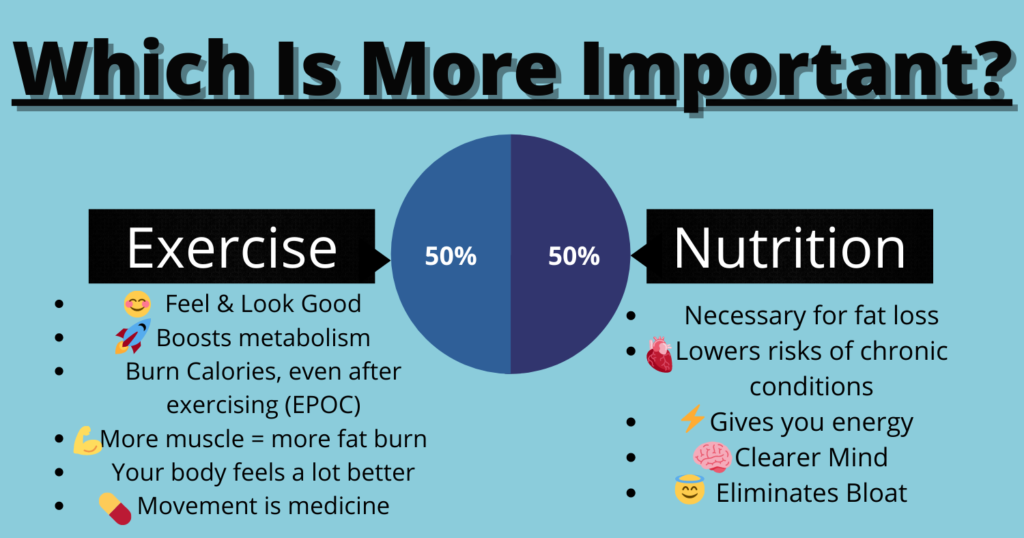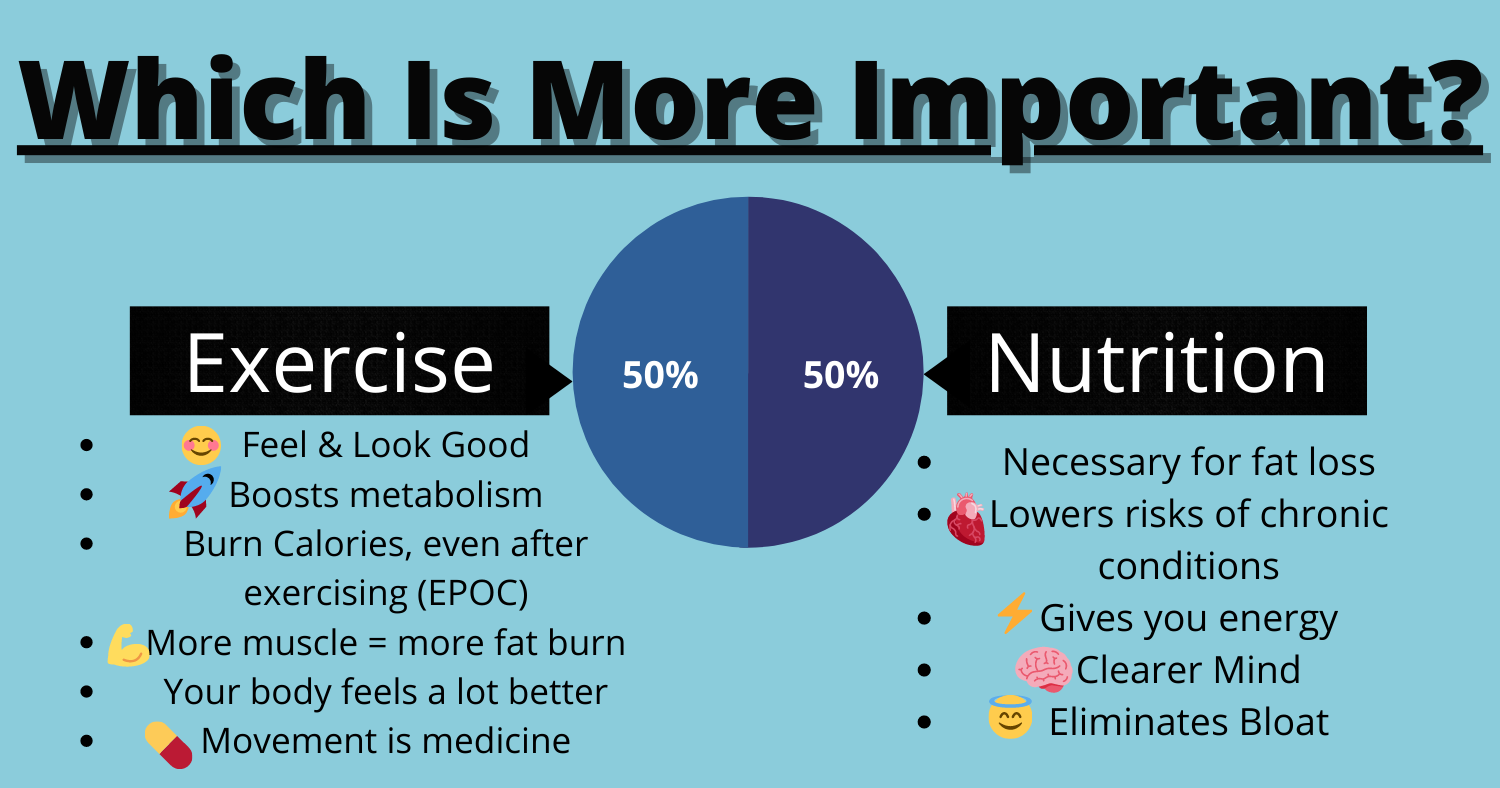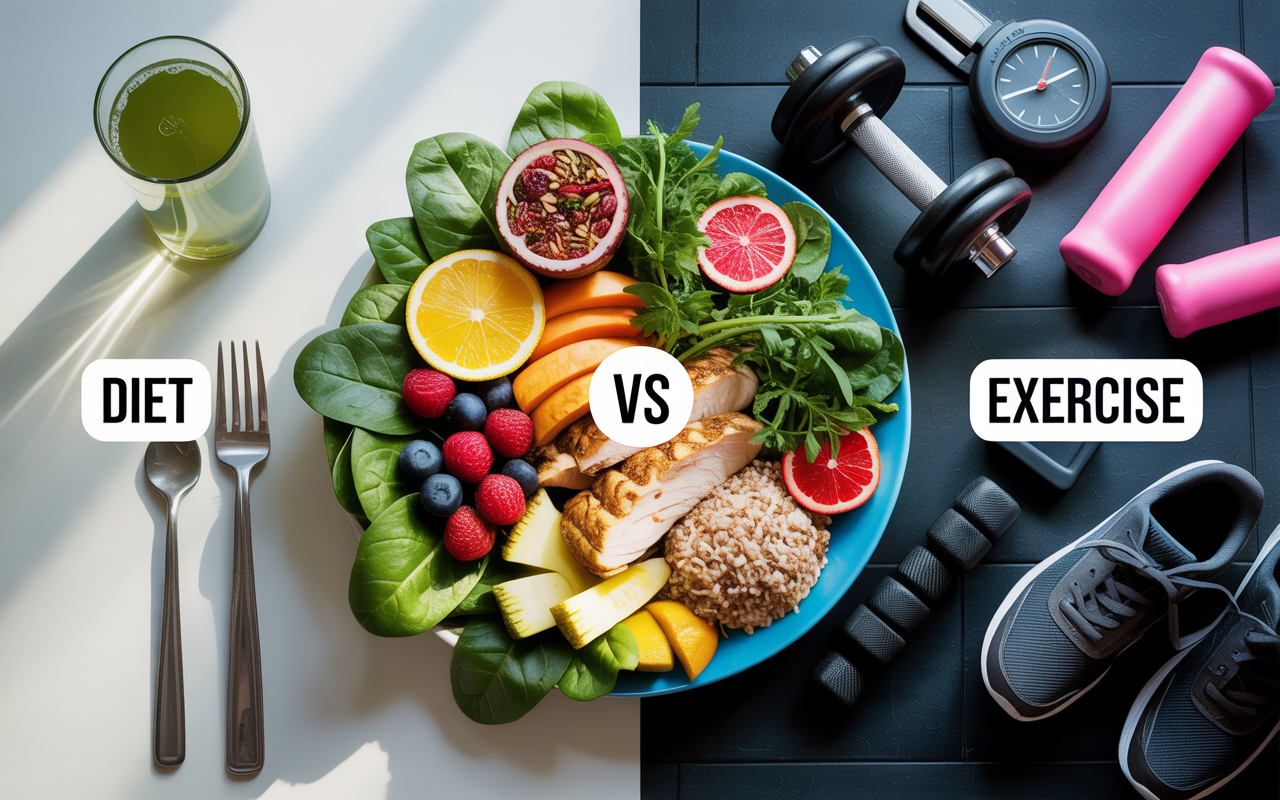Diet and exercise both play roles in weight loss. But which is more important?
This question puzzles many aiming to shed pounds. Weight loss often feels like a challenging puzzle. People wonder if diet or exercise holds the key. Each element offers unique benefits. Diet provides the body with essential nutrients. Exercise boosts energy and burns calories.
While both are crucial, understanding their impact helps. Many experts argue that diet holds more weight in the equation. This is because cutting calories is simpler through food choices. Exercise, however, shapes the body and improves health. Balancing both might be the ideal strategy. Exploring their roles further can guide those on the weight loss journey. Let’s delve deeper into this topic to uncover insights.
Introduction To Weight Loss Debate
Deciding between diet and exercise for weight loss can be overwhelming. Many people struggle to find the right balance. You may wonder which is more effective for shedding those extra pounds. Let’s dive into this debate and explore what truly matters in your weight loss journey.
The Diet Vs Exercise Dilemma
Diet and exercise are two pillars of weight loss. You might hear friends swear by their gym routines. Others might emphasize the importance of cutting carbs. The truth is, both play vital roles. Diet directly impacts calorie intake, while exercise influences calorie burning. Together, they form a powerful duo.
Consider this: You can spend hours at the gym but if your diet is full of processed foods, weight loss may stall. On the other hand, a balanced diet without any physical activity might leave you missing out on muscle toning and overall health benefits. It’s not just about choosing one over the other; it’s about finding a synergy that suits you.
Importance Of The Topic
Understanding the diet vs exercise debate is crucial for achieving your goals. You might have tried countless diets or bought expensive gym memberships without results. Knowing what works for you saves time, effort, and money.
This topic affects your health and wellbeing. Proper weight management prevents chronic diseases like diabetes and heart disease. It boosts energy and confidence. By focusing on both diet and exercise, you prepare yourself for a healthier lifestyle.
Here’s a question for you: Are you prioritizing one over the other? Reflect on your current habits and consider adjustments. Small changes can lead to significant results. Embrace the journey and remember, balance is key.

Credit: www.trainfenix.com
Role Of Diet In Weight Loss
When it comes to shedding those extra pounds, the role of diet in weight loss cannot be overstated. You might have heard the saying, “Abs are made in the kitchen.” This highlights the critical importance of what you eat in your weight loss journey. But how exactly does diet play a role? Let’s break it down.
Caloric Deficit And Nutrition
Creating a caloric deficit is key to losing weight. This means consuming fewer calories than your body burns. You might be surprised to learn how simple changes can help you achieve this. Start by tracking what you eat for a week. You’ll quickly spot high-calorie culprits in your diet.
Nutrition is equally important. Even when you’re cutting calories, you need to ensure your body gets the nutrients it needs. Choose foods that are high in vitamins and minerals but low in calories. This way, you’re feeding your body with the good stuff while keeping the calories in check.
Impact Of Food Choices
Your food choices can make or break your weight loss efforts. Think about the last time you opted for a salad over a burger. That simple choice not only saved calories but also provided you with fiber and essential nutrients.
Making smart choices can be surprisingly easy. Swap out sugary drinks for water or unsweetened tea. Choose whole grains over refined ones. Each choice adds up, steering you closer to your weight loss goals.
Have you ever wondered why some people seem to eat all the time and still stay slim? It’s often because they’re choosing foods that are filling but low in calories. Why not try adding more fruits and veggies to your meals? You’ll feel fuller without the added calories.
Ultimately, consider how your food choices align with your weight loss goals. Are you making decisions that support your journey or hinder it? Reflect on your daily habits and see where you can make changes.
Remember, diet isn’t just about restriction; it’s about making choices that nourish your body and support your health. Are you ready to make those changes?
Exercise And Its Benefits
Balancing diet and exercise is crucial for effective weight loss. Healthy eating reduces calorie intake, while physical activity burns excess calories. Together, they help maintain weight loss and improve health.
Exercise plays a crucial role in weight loss, offering benefits that go beyond just burning calories. It not only helps shed pounds but also boosts your mood, improves heart health, and enhances your overall well-being. Imagine feeling more energetic throughout the day and sleeping better at night—all thanks to regular physical activity.Types Of Exercise For Weight Loss
When it comes to shedding those extra pounds, not all exercises are created equal. Cardio workouts like running, cycling, and swimming are excellent for burning calories quickly. They get your heart pumping and can be adjusted to your fitness level, making them accessible to everyone. Strength training, on the other hand, helps build lean muscle mass, which is vital for maintaining weight loss. Don’t be intimidated by the weights; start with bodyweight exercises like squats and push-ups. As you get stronger, you can gradually add weights to challenge your muscles further. High-Intensity Interval Training (HIIT) is another effective option. It combines short bursts of intense activity with rest periods, maximizing calorie burn in a short time. Even a 20-minute HIIT session can be more effective than an hour of steady-state cardio.Metabolic Boost And Muscle Building
Exercise does more than just burn calories while you’re active—it boosts your metabolism even when you’re resting. This means your body continues to burn calories at a higher rate after your workout. This is often called the “afterburn” effect, and it’s one of the reasons why regular exercise is so effective for weight loss. Building muscle is another key component. Muscle tissue burns more calories than fat tissue, even at rest. So, by increasing your muscle mass through strength training, you’re effectively turning your body into a more efficient calorie-burning machine. Ever notice how some people seem to eat whatever they want without gaining weight? Often, it’s because they have a higher muscle mass, which helps them burn more calories throughout the day. You can achieve the same by incorporating strength training into your routine. Do you feel like you’ve hit a plateau in your weight loss journey? It might be time to switch up your exercise routine. Trying new types of workouts can not only jumpstart your progress but also keep things interesting and fun. By integrating different forms of exercise into your routine, you can enjoy a variety of benefits that go beyond just weight loss. Why not give it a try and see how it transforms your body and mind?Comparing Diet And Exercise
When it comes to weight loss, people often debate diet and exercise. Both play crucial roles in achieving and maintaining a healthy weight. Understanding their impacts can help you choose the right focus.
Efficiency In Calorie Burn
Exercise burns calories, but diet controls calorie intake. Running can burn 300 calories in 30 minutes. Eating a burger can add 500 calories in minutes. Diets can be more efficient for creating a calorie deficit. Exercise boosts metabolism and builds muscle. Both are key for long-term weight management.
Sustainability And Lifestyle
Changing diets can lead to rapid weight loss. Yet, many struggle to maintain strict diets over time. Exercise routines can be enjoyable and sustainable. Walking, cycling, or dancing fits naturally into daily life. Balance is crucial. A flexible diet alongside regular exercise often results in lasting success.
Scientific Studies And Findings
Weight loss is a journey often filled with questions about the most effective methods. Should you prioritize diet, or focus on exercise? Scientific studies offer insights that can guide your decisions. This section delves into the latest research findings to shed light on what might be more important for your weight loss goals.
Research On Diet Effectiveness
Studies consistently show that diet plays a crucial role in weight loss. A well-known study from the New England Journal of Medicine found that participants who focused on reducing calorie intake lost more weight than those who simply increased physical activity. This indicates that what you eat significantly impacts your weight loss journey.
Another study highlighted the importance of the type of diet. Low-carb diets, for instance, often result in quicker weight loss compared to low-fat diets. The key takeaway? Choosing the right diet can make a substantial difference in your weight loss success.
Have you noticed how cutting out sugary drinks or processed foods can lead to noticeable changes on the scale? That’s the power of diet. Simple changes in your eating habits can lead to significant results.
Exercise Impact Studies
Exercise also plays a vital role, although its impact might be different. Research published in the journal Obesity Reviews suggests that while exercise alone might not lead to significant weight loss, it is crucial for maintaining weight loss and improving overall health.
Interestingly, exercise helps build muscle, which can boost your metabolism. A study from Harvard University found that combining strength training with aerobic exercise was more effective in reducing belly fat compared to aerobic exercise alone. This highlights the importance of not just moving more, but moving smarter.
Have you ever experienced the endorphin rush after a good workout? That feeling isn’t just beneficial for your mood; it’s a great motivator to keep you on track with your weight loss efforts.
So, what should you focus on more? Both diet and exercise are important but play different roles. Are you adjusting your diet and exercise routine to meet your weight loss goals effectively?

Credit: www.facebook.com
Psychological Aspects
Balancing diet and exercise impacts weight loss, but psychological aspects play a crucial role. Motivation, self-control, and stress management significantly influence success. Understanding these factors can enhance efforts toward achieving personal fitness goals.
Understanding the psychological aspects of weight loss is crucial. Both diet and exercise have mental components. These factors influence how individuals perceive their journey. A positive mindset can drive success. Negative thoughts might hinder progress. Mental strength often guides physical efforts. Let’s explore the mental side of weight loss.Motivation And Adherence
Motivation plays a key role in weight loss. It initiates the desire to change. Keeping this motivation alive is essential. People often start with enthusiasm. Yet, maintaining this drive is challenging. Adherence to a routine requires mental discipline. Setting small, achievable goals can help. Rewards for milestones boost motivation. Support from friends and family also aids adherence.Behavioral Changes
Behavioral changes are essential for lasting weight loss. They involve altering daily habits. This might include choosing healthier foods. Or dedicating time for regular exercise. These changes need mental commitment. Old habits can be hard to break. Building new routines takes time and effort. Positive reinforcement encourages these changes. It’s important to celebrate small victories. These affirmations strengthen the resolve to continue. “`Case Studies And Personal Stories
Balancing diet and exercise is crucial for effective weight loss. Case studies reveal diverse strategies people use to shed pounds. Personal stories highlight unique experiences, emphasizing the importance of finding a personalized approach.
In the debate of weight loss, personal stories offer insight. They show real-life experiences of people reaching their goals. These stories shed light on whether diet or exercise played a bigger role.Success With Diet Changes
Many find success by changing their eating habits. Sarah, a mother of two, lost 30 pounds. She focused on portion control and healthy food swaps. She found that cutting sugar made a big difference. Sarah’s energy levels soared, and her confidence grew. Her story is a testament to the power of mindful eating. John, a busy executive, struggled with weight for years. He decided to try a plant-based diet. Within months, John lost 40 pounds. He felt lighter and more energetic. His story highlights the impact of dietary choices on overall health.Exercise-driven Transformations
Exercise played a key role for others. Mike, a college student, wanted to lose weight. He started with daily walks and simple workouts. Over time, he added strength training. Mike lost 25 pounds and gained muscle. His journey emphasizes the benefits of physical activity. Lisa, a retired teacher, felt sluggish. She joined a local gym and committed to regular sessions. The result? A 20-pound weight loss and increased stamina. Lisa’s story shows how exercise can enhance daily life and well-being.
Credit: www.trainfenix.com
Conclusion And Recommendations
Balancing diet and exercise is key to effective weight loss. A healthy diet fuels the body, while exercise burns calories. Combining both leads to sustainable results.
When you’re on a weight loss journey, the debate often arises: should you focus more on diet or exercise? This question can feel overwhelming. Understanding the balance between diet and exercise can be the key to not only shedding pounds but also maintaining a healthy lifestyle. Let’s break it down.Balanced Approach Advocacy
A balanced approach to weight loss involves combining both diet and exercise. You might find that focusing solely on cutting calories leaves you feeling tired and deprived. Alternatively, relying only on exercise can be disheartening when the scale doesn’t budge. Many people, like my friend Jenna, have found success by integrating both. She started by adjusting her diet to include more vegetables and lean proteins. At the same time, she incorporated daily walks into her routine. This dual approach helped her lose 20 pounds over six months without feeling overwhelmed. A balanced approach can prevent burnout. You’re not drastically changing one aspect of your life. Instead, you’re making manageable adjustments across the board. It’s about finding harmony that works for you.Long-term Health Considerations
Focusing solely on diet or exercise might yield short-term results. However, for long-term health, it’s crucial to consider both. Diet changes can help you lose weight quickly, but exercise strengthens your heart and bones, boosts your mood, and improves overall fitness. Think about your future self. Would you rather have a slimmer figure temporarily or improved health that lasts a lifetime? Incorporating exercise into your routine ensures that you’re not just losing weight but gaining health benefits. A friend of mine, Tom, used to skip workouts and focus only on diet. He lost weight but felt weak and lethargic. After adding strength training and cardio to his routine, he not only maintained his weight loss but felt more energetic and confident. Are you considering the impact of your choices on your long-term health? It’s worth pondering. To make sustainable progress, aim for a blend of healthy eating and regular physical activity. Start small. Maybe swap sugary drinks for water and take the stairs instead of the elevator. Track your progress. Use an app or a journal to monitor both your meals and workouts. This can help you stay accountable and see what works best for you. Engage with supportive communities. Find a workout buddy or join an online group. Sharing your journey can provide motivation and new ideas. Remember, it’s not about perfection but consistency. Every small step counts. Consider what lifestyle changes you can maintain for the long haul. It’s your journey, and you have the power to shape it.Frequently Asked Questions
What Is More Effective For Weight Loss, Diet Or Exercise?
Both diet and exercise play crucial roles in weight loss. A healthy diet reduces calorie intake, while exercise boosts metabolism and burns calories. Combining both is the most effective strategy for sustainable weight loss and overall health improvement. Balance is key for achieving and maintaining desired results.
Is Weight Loss 80 Diet And 20 Exercise?
Weight loss often follows the 80/20 rule, with 80% based on diet and 20% on exercise. Eating healthy foods and regular physical activity are crucial for effective weight management. Balancing both aspects maximizes results and supports long-term health.
Is Diet Or Exercise More Important To Lose Belly Fat?
Both diet and exercise are crucial for losing belly fat. A balanced diet reduces calorie intake, while exercise boosts metabolism and burns fat. Combining healthy eating with regular physical activity leads to effective fat loss. Prioritize whole foods and consistent workouts for the best results.
Do You Need To Exercise To Lose Weight Or Just Diet?
Diet alone can help you lose weight, but exercise boosts results and improves overall health. Combining both leads to sustainable weight loss and fitness. Exercise enhances metabolism and tones the body, while dieting controls calorie intake. Aim for a balanced approach for effective and long-lasting results.
Conclusion
Balancing diet and exercise is key for weight loss success. Both play important roles. Diet controls calories and nutrients. Exercise burns calories and builds strength. Together, they create a healthy lifestyle. Choose foods that support your goals. Find physical activities you enjoy.
Consistency matters more than perfection. Small changes add up over time. Listen to your body’s needs. Stay motivated by setting realistic goals. Celebrate small victories to maintain motivation. Remember, everyone’s journey is unique. What works for one may not work for another.
Keep focusing on what feels right for you. Stay patient and trust the process.









